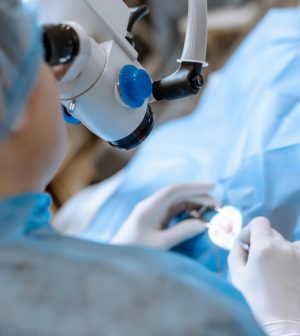- Could Your Grocery Store Meat Be Causing Recurring UTIs?
- Are You Making This Expensive Thermostat Error This Winter?
- Recognizing the Signs of Hypothyroidism
- 10 Strategies to Overcome Insomnia
- Could Artificial Sweeteners Be Aging the Brain Faster?
- Techniques for Soothing Your Nervous System
- Does the Water in Your House Smell Funny? Here’s Why
- Can a Daily Dose of Apple Cider Vinegar Actually Aid Weight Loss?
- 6 Health Beverages That Can Actually Spike Your Blood Sugar
- Treatment Options for Social Anxiety Disorder
GLP-1 Meds May Help Extremely Obese Qualify for Weight-Loss Surgery

Taking a cutting-edge weight-loss drug could help extremely obese patients drop enough pounds to be eligible for bariatric surgery, a new study shows.
Patients with extreme obesity — a BMI of 70 or more — are at higher risk of complications from surgery compared to people who weigh less.
Weight loss prior to surgery can lower that risk, but up to now nothing’s been able to help patients lose enough weight to make a difference, researchers say.
However, new GLP-1 agonist medications like Ozempic, Wegovy and Zepbound have been shown to help people quickly shed pounds.
For this trial, researchers recruited 113 extremely obese patients and assigned them to either a single GLP-1 drug, more than one GLP-1 drug or a medically supervised diet and exercise program. Patients were treated an average of 73 days.
People on multiple drugs had the greatest weight loss, dropping about 13% of their total body weight.
A single GLP-1 drug helped people lose a little more than 8% of their body weight, while diet and exercise helped participants drop about 6% of their body weight.
The findings were presented Thursday at the American Society for Metabolic and Bariatric Surgery’s annual meeting in San Diego.
“Combining anti-obesity medications may achieve much greater pre-surgery weight loss than other methods for those with extreme obesity,” said researcher Dr. Phil Schauer, director of the Metamor Metabolic Institute at Pennington Biomedical in Baton Rouge, La. “Many patients who would otherwise be considered ‘too sick for surgery’ may now qualify.”
More than 42% of Americans are obese, researchers said in background notes.
GLP-1 drugs work by mimicking a hormone in the body that controls insulin release and acts to reduce hunger and delay stomach emptying.
“More studies are needed to determine the optimal role of GLP-1s before and after metabolic and bariatric surgery among different patient groups,” Dr. Marina Kurian, president of the American Society for Metabolic and Bariatric Surgery, said in a meeting news release.
“Obesity must be viewed like other chronic diseases, where sometimes more than one therapy is necessary over time and for different reasons,” added Kurian, who was not involved in the study.
Because this research was presented at a medical meeting, it should be considered preliminary until published in a peer-reviewed journal.
More information
Harvard Medical School has more about GLP-1 agonist drugs.
SOURCE: American Society for Metabolic and Bariatric Surgery, news release, June 13, 2024
Source: HealthDay
Copyright © 2026 HealthDay. All rights reserved.










